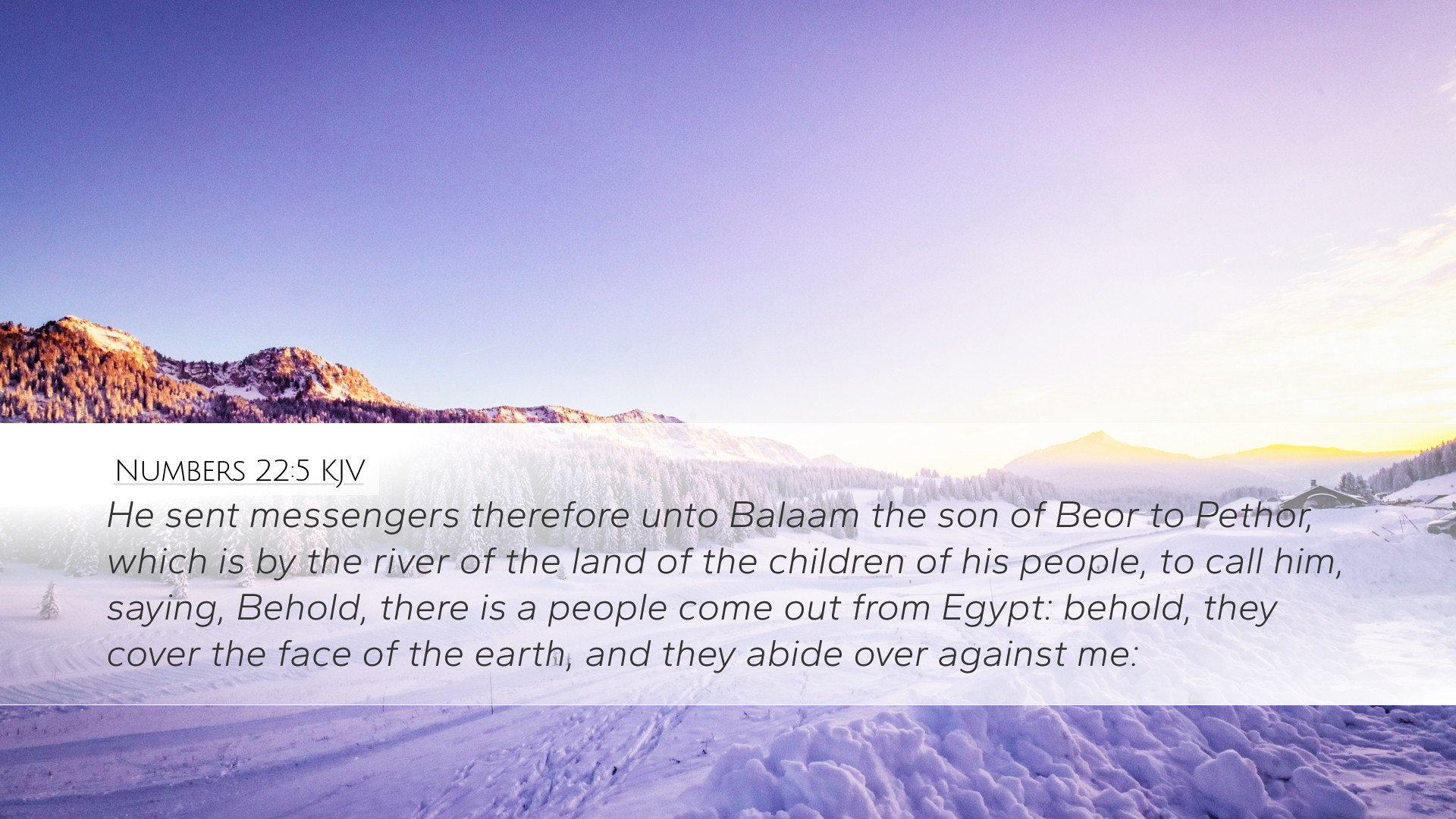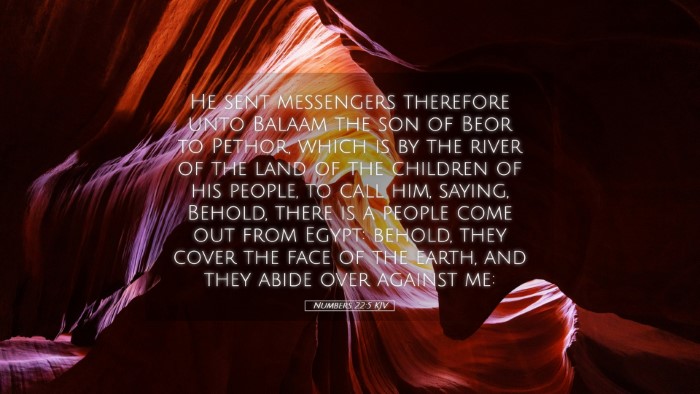Commentary on Numbers 22:5
Numbers 22:5 states:
"He sent messengers therefore unto Balaam the son of Beor to Pethor, which is by the river of the land of the children of his people, to call him, saying, Behold, there is a people come out from Egypt: behold, they cover the face of the earth, and they abide over against me."
Introduction
The narrative surrounding Numbers 22 is critical in understanding the relationship between God’s chosen people, Israel, and the surrounding nations, particularly Midian and Moab. This passage explicitly introduces Balaam, a figure associated with prophecy and divination, highlighting the tension in his dual allegiance to God and the desires of men. The intricate dynamics of faith, influence, and the divine are presented here and merit thoughtful consideration.
Contextual Background
To fully appreciate the significance of Numbers 22:5, it is imperative to examine the broader historical and theological context:
- The Israelites' Journey: The Israelites, post-Exodus, are on their way to the Promised Land, creating a concern among neighboring nations.
- The Fear of Israel: The Moabites and Midianites are alarmed by the large numbers and conquests of Israel. Their fear drives King Balak to seek assistance from Balaam.
- Balaam’s Reputation: Balaam, known for his ability to bless or curse, holds a significant position as a seer, garnering both fear and respect from surrounding nations.
Insights from Public Domain Commentaries
Matthew Henry's Commentary
Matthew Henry emphasizes Balaam’s character—as one who had a reputation for speaking God’s word but was susceptible to the lure of riches and honor offered by Balak. Henry suggests:
- The Nature of Balaam: Despite his initial appearance as a prophet of God, Balaam’s heart was inclined towards personal gain rather than true devotion to God. His motives become questionable when he does not immediately reject Balak’s invitation.
- The Role of Divine Sovereignty: Henry draws attention to God's sovereignty over all nations and individuals, indicating that God can use even those with dubious intentions to fulfill His purposes.
- Moral Lessons: The invitation to Balaam serves as a cautionary tale about being led astray by worldly desires, urging believers to remain steadfast in their devotion to God’s will rather than be swayed by external pressures.
Albert Barnes' Notes on the Bible
Albert Barnes further expands on the implications of Balak's actions in sending for Balaam:
- Political Alliances: Balak’s strategy illustrates the political maneuvering of ancient nations seeking supernatural help for military campaigns. This reflects the human inclination to seek control over intangible forces.
- Balaam’s Response to Requests: Barnes highlights that Balaam’s hesitance, even amidst the allure of power, signifies an internal conflict caused by his understanding of the God he served.
- Importance of Divine Consultation: The need for Balaam to seek God’s counsel before responding to Balak showcases the necessity for believers to align their actions with divine will.
Adam Clarke's Commentary
Adam Clarke offers unique insights into the cultural and geographical context of Numbers 22:5:
- Pethor as a Culturally Significant Location: Clarke points out that Pethor, situated by the Euphrates, indicates Balaam's possible connections with ancient Mesopotamian culture, known for its mystical practices.
- Invocation of Divine Authority: The message sent by Balak resurfaces the theme of dominion—how earthly kings often mistakenly believe they can control or influence divine will through intermediaries like Balaam.
- Spiritual Warfare: Clarke’s commentary reflects on the underlying spiritual conflict; Balak’s attempt to subvert God’s plan with a curse on Israel reveals the age-old battle between righteousness and unrighteousness.
Theological Reflections
The theological dimensions of Numbers 22:5 prompt several reflections relevant to modern readers and scholars:
- God’s Sovereign Purpose: This passage exemplifies how God’s purpose prevails across nations and personal ambitions, reinforcing the assurance that He is in complete control, despite human machinations.
- The Nature of True Prophecy: Balaam’s narrative invites discussions about the nature of prophecy, raising questions about authenticity, motivation, and divine alignment.
- Human Vulnerability to Compromise: The invitation to Balaam serves as a warning regarding the susceptibility of individuals to compromise their faith in pursuit of personal advantage or fear of man over God.
Application for Believers
The insights gathered from this commentary can be applied in multiple facets of life for pastors, theologians, and scholars:
- Guidance in Leadership: Just as Balak sought Balaam’s counsel covertly, leaders today must be wary of seeking external validations that may lead them astray from God-driven decisions.
- Maintaining Spiritual Integrity: The cautionary tale of Balaam encourages individuals to examine their hearts and motivations regularly to ensure they align with God’s will.
- Understanding God’s Will in Community: The corporate experience of Israel showcases the need for community discernment when confronted with choices influenced by worldly powers.
Conclusion
Numbers 22:5 invites readers into a narrative where the intentions of nations collide with the divine purpose of God. Through insights gleaned from respected commentaries, one can appreciate the layers of spiritual truth that resonate with contemporary Christian life. As we delve into these ancient texts, may we be reminded of the ever-persistent challenge to align our will with God's and to remain steadfast in our faith amidst external influences.


